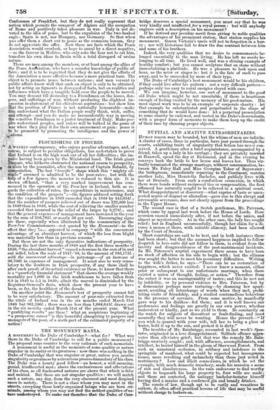NUPTIAL AND .A.MATIVE EXT_RA ORDINARIES.
'lumen. reason may be bounded, but the whims of men are infinite.. A. cluster of eases, three in particular, have just passed through the courts, exhibiting traits of singularity that fiction has never con- ceived. A gentleman after a brief acquaintance, accompanied by a friend, takes up a lady in his carriage ; they are privately married at Hanwell, spend the day at Richmond, and in the evening he conveys back the bride to her house and, leaves her. Thus vir- tually termithated the strange marriage, without consummation, be- tween Mr. Foley Hall and Miss Georgina Tabor of Bayswater : the bridegroom, immediately. repairing to the Continent, marries another lady, Miss Henrietta Bachelor, and publicly lives with her at Ernscels. From such a comfortless connexion, in which there were bonds without reciprocal ties or compensatiOn, the first affianced has naturally sought to be relieved in a spiritual court- What disappointment or discovery—what caprice of taste or unex- pected source of disgust or alienation—gave rise to this abrupt an& irrevocable severance, does not clearly appear from the proceedings in the Upper House. The second case is that of a Scotch gentleman, Mr. Paterson, which came by appeal last week before the House of Lords. Here aversion ensued immediately after' if not before the union, and almost as mysteriously. As in the other case, the lady has sought relief; but in England unsuccessfully, though her claim for a di- vorce i mensa et thoro, with suitable alimony, had been allowed by the Court of Session.
Short courtships are said to be best, and in both instances these had been short; but that the assumed happiness implied to follow despatch in love-suits did not follow in them, is evident from the brevity and disagreeableness of the post-matrimonial incidents. In Mr. Paterson's nuptial experiment there seems to have been no stock of affection on his side to begin with ; but the alliance was sought the better to meet his pecuniary difficulties. Writing to the wife's father, he says—"There can be no restoration of happiness, which never existed: I never knew a moment, either prior or subsequent to our unfortunate marri;age when there existed a union of thought, feeling, or action. Therefore from the outset it was an uncongeniality of tastes ; and this he met not by infidelity, or by personal violence to Mrs. Paterson, but by a demeanour perhaps more torturing—by shunning her apart- ment, avoiding all mterehange of words when they met, prohi- biting visits of friendship, and a studied contumelious behaviour in the presence of servants. From some motive, he manifestly gave way to his dislikes—fed them; and it is well known our preferences and feelings are greatly in our own power, whether malevolent or kindly, just as we yield to them. Be constantly on the watch for subjects of discontent or fault-finding, and most assuredly they will never be wanting. Hence the proverb—" If you wish to quarrel with your wife, tell her to bring a glass of water, hold it up to the sun and protest it is dirty." The troubles of Mr. Baiabrigge, recounted in last week's Spec- tator, originated in a love disappointment. Solitude oftener aggra- vates than alleviates grief; but that was the remedy Mr. Bain; brigge unwisely sought ; and, with affluence, accomplishments, and intellect, he buried himself bathe gloom of Sherwood Forest. From such an unnatural seclusion, in celibacy and indolence in the springtide of manhood, what could be expected but incongruous issues, more revolting and melancholy. than those just noted in matrimony ? Low and illicit connexions in which he set the example, with much domestic treachery, naliide his mansion a scene of riot and dissoluteness. In the vain endeavour to find worthy objects to bequeath his large property to, four wills are made; and these are contested, the unhappy. bachelor-testator himself having died. a maniac and. a confirmed gm and brandy drinker.
The courts of law, though apt to be costly and vexatious to suitors, do often afford practical lessons of life that may be useful without charge to lookers-on.


























 Previous page
Previous page